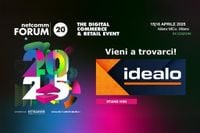The digital marketing landscape is undergoing an unprecedented transformation, with 78% of companies completely redefining their digital strategies for 2025. Digital marketing trends for 2025 are emerging as a crucial turning point for businesses of all sizes. Artificial intelligence, voice search, and hyper-personalization are rapidly redefining how companies interact with their customers. In particular, the introduction of innovative technologies such as vibe-coding and mini SaaS platforms is opening new possibilities for marketers in Italy. This guide explores the emerging trends that will shape the future of digital marketing, offering a detailed overview of the technological innovations and strategies that will determine the success of companies in the near future.
As we look to 2025, digital marketing trends will be driven by advanced technologies that are already transforming how businesses reach and engage customers. Future strategies will require an integrated approach that leverages emerging innovations to create more engaging and profitable customer experiences.
Artificial Intelligence (AI) is becoming a central element in modern marketing strategies, with around 68% of marketers already using or planning to implement AI-based technologies. In 2024, nearly half of the companies adopting AI experimented with generative AI for written language, demonstrating how data analysis is evolving from simple monitoring to predictive tools. The sectors driving this growth are primarily informatics (36.7%), telecommunications (27.6%), and audiovisual content production (28.3%), while the areas benefiting most from AI are marketing and sales (35.7%).
Voice search and voice commerce represent a fundamental transformation in how consumers interact with brands. By 2025, voice searches are expected to exceed 50% of total online searches, making it crucial for companies to optimize for this format. This trend is fueled by the proliferation of virtual assistants like Google Assistant, Siri, and Alexa. Web pages must be optimized to respond to natural and conversational questions, focusing on long-tail keywords and more complex queries.
Hyper-personalization represents the evolution of simple personalization, using real-time behavioral data to create tailored experiences. This advanced strategy combines behavioral data with real-time information, going beyond merely inserting a name in emails. According to a report by Accenture, 91% of consumers are more likely to buy from brands providing personalized offers, while another study found that 80% of customers are more inclined to complete a purchase from brands offering personalized experiences.
In 2025, social media will function as search engines, requiring integrated SEO strategies in social content. AI is transforming these platforms into engines of personalization and active listening, while inclusivity becomes a must-have for marketing strategies. Additionally, emerging platforms like BeReal, Lemon8, and Threads are gaining popularity, offering opportunities to create more authentic connections with customers. This evolution requires companies to be easily traceable across all platforms, not limiting themselves to curating a single profile.
Emerging technologies are reshaping the digital tools available to marketers, with two particularly promising innovations gaining traction in 2025: mini SaaS and vibe-coding.
Vibe-coding represents a paradigm shift in software development. This innovative approach, coined by Andrej Karpathy, former AI director at Tesla, allows users to create software simply by describing in natural language what they want to achieve. Instead of writing code line by line, users "converse" with an AI that translates their requests into functioning applications. The process follows an interactive flow where the AI becomes a true partner in development, handling code generation and debugging while the user focuses on the big picture.
For marketing professionals, vibe-coding offers unprecedented opportunities. Firstly, it eliminates reliance on development teams, allowing for the rapid creation of landing pages, chatbots, or analytical tools. Development times are drastically reduced: tasks that previously took weeks can be completed in a few hours, accelerating time-to-market and reducing costs. This democratization of software development, known as "citizen development," also enables those without technical skills to create customized digital tools, fostering greater internal innovation and the ability to experiment with new ideas without facing complex technical hurdles.
Among the most interesting solutions in this area is Hostinger Horizons, an AI app builder that allows users to create web applications without any programming experience. Users simply describe what they want to achieve in their language, and the tool generates the app almost instantly. Changes happen in real-time through a chat with the AI agent, with the ability to test everything in a sandbox environment. This solution supports over 80 languages, including speech and images, and allows for app deployment with a single click. Plans start at €9.99/month, making this technology accessible even for small businesses and individual entrepreneurs.
The Italian digital market is experiencing a transformation phase that offers numerous opportunities for companies that can interpret the ongoing changes. With an internet penetration of 89.9%, Italy presents fertile ground for innovative digital marketing strategies tailored to local specifics. Digital advertising spending in Italy reached €5.5 billion in 2024, marking a significant 12% increase from 2023. Mobile advertising dominates the market, accounting for 56% of total investments, while there is a strong increase in advanced/connected TV (+23%) and video advertising (+18%).
A significant 61% of Italian B2B companies with revenues over €2 million already use e-commerce, generating 11% of their turnover through digital channels, a figure expected to grow to 25% in the next three years. This trend confirms that digital transformation is now essential for competitiveness in the Italian market.
The Digital Services Package, approved on July 5, 2022, is introducing radical changes in the Italian digital landscape through the Digital Markets Act (DMA) and the Digital Services Act (DSA). The DMA aims to regulate large digital platforms defined as "gatekeepers" and to combat abuses of dominant positions, while the DSA governs digital services to strengthen the protection of users' rights online. For Italian companies, quickly adapting to these regulations represents not only an obligation but also a strategic opportunity. Companies that swiftly align with the AI Act regulations can differentiate themselves by offering "compliance by design" solutions, thus gaining a significant competitive edge.
The current context offers notable development opportunities for Italian companies that can adopt a holistic approach to digital marketing. The funds allocated by the EU represent a concrete opportunity to finance technological innovation, particularly important in a country where spending on digital advertising accounts for 48% of total advertising investments, compared to a European average of 63%. Companies investing in the personalization of their offers can achieve higher conversion rates, while those embracing eco-friendly practices not only gain a competitive advantage but also attract an increasingly conscious audience.
In conclusion, the digital marketing trends for 2025 clearly show how digital transformation has become fundamental for business success. AI, along with emerging technologies like vibe-coding and mini SaaS, is redefining how Italian companies interact with their customers. While adopting these innovations requires a significant initial investment, both in economic terms and in staff training, the benefits far outweigh the costs, especially considering the growth potential in the Italian market, where digital advertising spending continues to rise. Companies that embrace these new technologies while adhering to DSA and DMA regulations will find themselves in a privileged position to capture market shares. The key to success lies in balancing technological innovation with attention to the specific needs of their audience.




